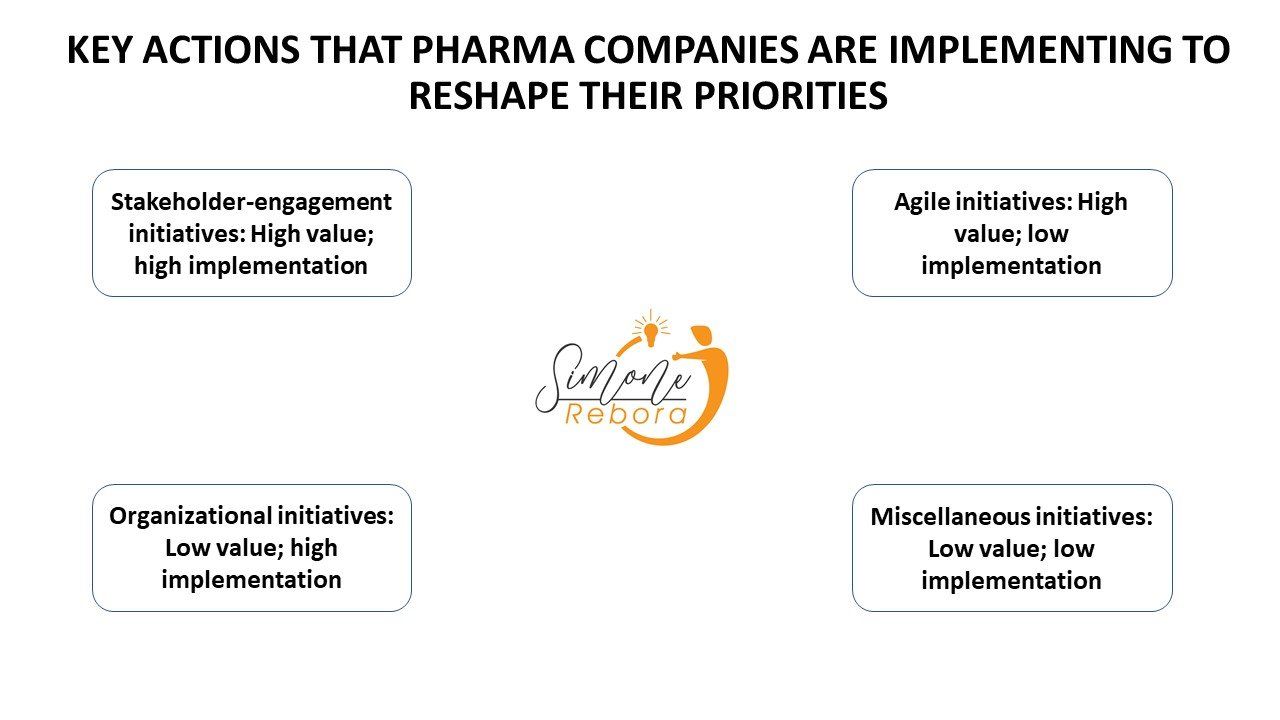HOW PHARMA COMPANIES ARE RESHAPING THEIR PRIORITIES
Simone Rebora • 28 febbraio 2022
In the pharmaceutical industry, as in many others, the COVID-19 pandemic has suddenly forced companies to operate differently. Ways had to be found to make fast decisions, even though it was sometimes difficult to convene all those in the organization that would usually be part of the process


In the pharmaceutical industry, as in many others, the COVID-19 pandemic has suddenly forced companies to operate differently. In-person meetings with colleagues became virtual, for instance, as did those with healthcare providers (HCPs)—if indeed HCPs had the time to engage with field representatives at all. Ways had to be found to make fast decisions, even though it was sometimes difficult to convene all those in the organization that would usually be part of the process.
The result was an acceleration of certain commercial-organizational trends, as well as companies already accustomed to agile ways of working were able to adapt faster to the pandemic. In a nutshell, companies are facing an important business question: how could organizations best engage with already-overstretched stakeholders?
The traditional commercial model will no longer be fit for purpose, touchpoints with HCPs will be simplified, and companies will outsource more components of the value chain to focus on their core capabilities.
My purpose is to understand where companies were focusing their efforts right now, Even though most respondents agreed that organizational structures will become much simpler, they regard some of the initiatives that could deliver that change:
Stakeholder-engagement initiatives: High value; high implementation
At the top of the list is the broader development of digital and analytic capabilities. That development was a high priority before the COVID-19 pandemic, but many companies are now doubling down on building these capabilities to strengthen virtual interactions with healthcare professionals, give more employees more data and information for fast decision making, and facilitate seamless engagement with stakeholders. Companies are also newly prioritizing HCPs’ and other stakeholders’ access to subject-matter experts. Before the pandemic, such interaction was rare: experts did not have the capacity to attend in-person meetings, and it might have felt awkward for them to join meetings by phone. But times have changed. Accustomed to pandemic-related working conditions, most HCPs would now appreciate an offer to transfer their calls to experts—a move that improves a company’s remote interactions with HCPs and extends expert’s reach. Recognizing the value, one company has created new, non-sales roles that serve as single points of contact for HCPs and stakeholders, whatever their needs: commercial, medical, or market access. The aim is to help connect stakeholders to the right information and right expert instantly.
Agile initiatives: High value; low implementation
Agile initiatives tend to be perceived as key priorities, and many companies that have implemented them have seen rewards. The consequences of slow progress have been made clear during the pandemic, when all companies have been forced to be more agile. When operating in a virtual world, interactions with coworkers, cross-functional experts, and managers cannot happen by chance. They require intent, which has often resulted in smaller meetings and more careful consideration of who should be present, and decisions are needed quickly. Inevitably, it has been the companies with more experience in agile practices that have had the edge under crisis conditions. They are accustomed to working in smaller, empowered, cross-functional teams to speed progress, and are familiar with practices that have helped them adapt. The pandemic experience perhaps helps explain the high value of introducing agile methodologies more broadly across the organization and to two supporting initiatives:
- Performance management. The first initiative is the redesign of performance management to include metrics other than sales to encourage entrepreneurial action and a focus on what matters most to HCPs.
- Risk management. The second initiative is a more thoughtful, flexible risk-management approach that no longer considers each product or business unit in the same way. Recognizing the differences among them can help accelerate speed to market.
Organizational initiatives: Low value; high implementation
Though there is much talk of how the COVID-19 pandemic has accelerated certain trends in the world of work, less mention is made of the initiatives that have been deprioritized. Low value was assigned to reassessing the size of the field workforce—a common, prepandemic initiative aimed at deploying resources as cost-effectively as possible. Low value was also assigned to structuring business units around the capabilities needed to serve HCPs and stakeholders rather than traditional therapeutic areas, functions, and geographies. One potential explanation is the high importance given to the HCP experience. When it comes to the effectiveness of the field workforce, the quality of HCP engagement may matter more than the coverage does. And executives are perhaps questioning whether it is worth investing so much in internal organizational initiatives, having witnessed companies still thriving when their existing structures have been blown apart by the pandemic. HCP engagement and agility could prove to be the main keys to performance.
Miscellaneous initiatives: Low value; low implementation
Having marketers take up “scrum master” roles in agile teams, would have depended on companies making considerable progress in implementing agile ways of working, and even then, they might not have been seen to offer much additional value. Others, such as creating office-based, stakeholder-facing teams of pooled resources able to address broad stakeholder needs remotely 24/7, were only ever experimental and, it seems, failed to prove their worth. It seems unlikely that they will be reevaluated any time soon.
So what?
The COVID-19 pandemic has created an inflection point at which companies have the license to reconsider where they are investing time and resources. Any pharma company not implementing the high-value stakeholder-engagement initiatives discussed here should consider doing so without delay. If they fail to do so, they will surely struggle to compete against those able to deliver what HCPs and other stakeholders want, how they want it, and when they want it. Many companies also have the scope to accelerate all things agile to support HCPs and their patients further, from the way content is created to the way capability building is delivered at scale.

Over the past months, through my LinkedIn series “Chapter: The Promise Journey,” I have explored how AI is weaving a transformative red thread throughout pharma’s complex ecosystem. This article offers a comprehensive summary and reflections on the early stages of this journey, highlighting the immense promise AI holds, and the leadership and cultural shifts required to fully realize its potential.

As artificial intelligence reshapes the pharmaceutical landscape, I am compelled to synthesize the key milestones and reflections from my LinkedIn series, The Promise AI Journey, into this first comprehensive summary. This article distills lessons from building AI roadmaps, navigating Pharma’s unique challenges, and envisioning a future where AI accelerates both innovation and ethical responsibility.

